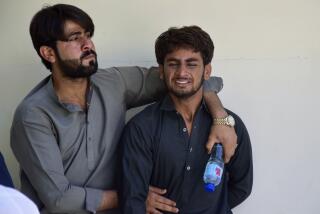New Assaults Raise Fears Along Border of Afghanistan
- Share via
KABUL, Afghanistan — Afghan politicians and coalition forces Wednesday reported fresh assaults from presumed Taliban and Al Qaeda fighters in the lawless eastern border area with Pakistan, giving credence to fears of a looming offensive by holdouts loyal to Osama bin Laden.
Afghan and U.S. sources also confirmed new outbreaks of fighting among factions in the north and east, suggesting a steady unraveling of the unified support that ethnic rivals had pledged to the interim government of Prime Minister Hamid Karzai.
“Perhaps the enemies of peace will make the most efforts to disrupt the situation in these last weeks before the loya jirga,” Foreign Minister Abdullah said of the clashes. The loya jirga, a convention of tribal elders expected to select the next government, begins its deliberations in Kabul on June 10.
“Taliban and Al Qaeda are present in Pakistan, there is no doubt,” he told reporters after meeting with his visiting Japanese counterpart, Yoriko Kawaguchi. But he insisted that authorities in Islamabad, the Pakistani capital, are aligned with those in Kabul, the Afghan capital, and the U.S.-led coalition in their determination to thwart destabilization of this country ravaged by a quarter-century of occupation and civil war.
Karzai’s 30-member Cabinet has been struggling to hold the fractious ethnic groups together since it was inaugurated more than four months ago, and concerns are widespread that the infighting is accelerating.
Vicious disputes between rival Afghan warlords appear to be complicating preparations by coalition forces to counter any renewed offensive around the eastern city of Khowst and in the seething tribal areas of Pakistan along the Afghan border.
Early today, British Brig. Roger Lane at Bagram air base confirmed that about 1,000 coalition troops have begun a major operation in the mountains of southeastern Afghanistan. The British-led Operation Snipe will be supported by U.S. air power and special operations troops, an American spokesman said.
U.S. troops of the elite 101st Airborne Division are being deployed to back up several hundred British marines in the Khowst area. Rugged mountain terrain and deep anti-American sentiments in the region have long provided a haven for Bin Laden foot soldiers driven from power by the U.S.-backed Northern Alliance in November.
U.S. forces using a trade school as a base in Miranshah, just across the border in Pakistan, were fired on early Wednesday in a barrage originating from Afghan soil, local officials said. No one was injured, but the harassment demonstrated the lurking hostilities toward a U.S. presence in the area.
The area had been leafleted in recent days by a group calling itself the Moujahedeen of North Waziristan, warning that anyone supporting “the hypocrite rulers” of the interim Kabul government would be dishonoring the Islamic faith.
Local warlords whom the coalition forces have previously relied on for intelligence have increasingly used their clout with U.S. forces to call in strikes against their Afghan rivals.
On Tuesday, the U.S. general commanding ground troops in Afghanistan hinted that coalition forces are now wary of further cooperation with Bacha Khan, who helped drive the Taliban out of his region last winter. After a barrage of artillery fire in recent days killed 30 civilians, Army Maj. Gen. Frank L. Hagenbeck observed that although Bacha Khan had once been an ally, “there are no permanent alliances.”
Meanwhile, the first planeload of pro-Taliban prisoners since February arrived Wednesday at the U.S. naval base at Guantanamo Bay. About 30 detainees were transported without incident. The 300 detainees already in Cuba were moved from temporary outdoor cages to a new indoor facility on Sunday and Monday.
And the North Atlantic Treaty Organization announced that it will end anti-terrorism surveillance flights over New York and Washington on May 16.
Times staff writer John Hendren in Washington contributed to this report.
--- UNPUBLISHED NOTE ---
Beginning in stories published in 2006, the Afghan warlord Bacha Khan is identified as Pacha Khan Zadran. (Second reference is “Pacha Khan.”)
--- END NOTE ---
More to Read
Sign up for Essential California
The most important California stories and recommendations in your inbox every morning.
You may occasionally receive promotional content from the Los Angeles Times.














